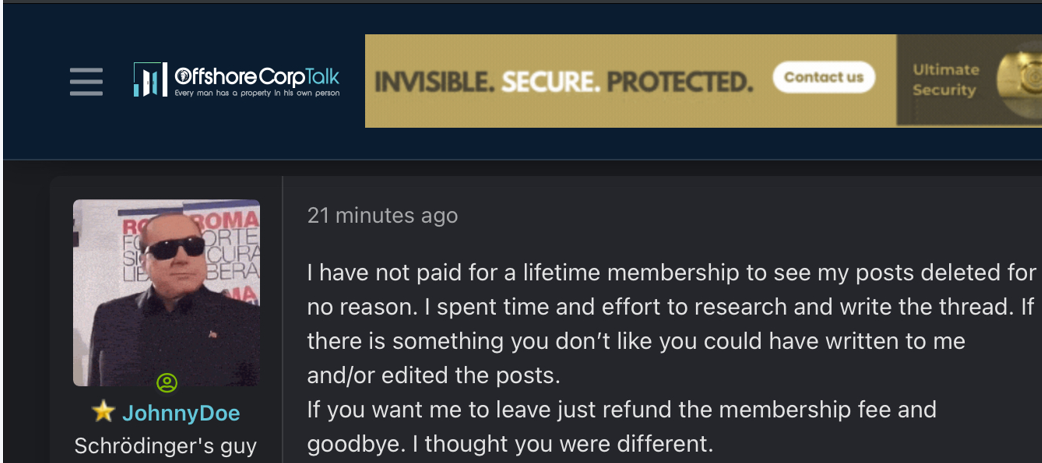Complaint Review: Cavalry Portfolio Service - Margate Florida
- Cavalry Portfolio Service PO Box 934788 Margate, Florida U.S.A.
- Phone:
- Web:
- Category: Collection Agency's
Cavalry Portfolio Service garnished my checking account, which is my income from Social Security ripoff Margate Florida
*UPDATE Employee: Garnishment
*Consumer Suggestion: Calvin
*Consumer Suggestion: Calvin
*Consumer Suggestion: Calvin
*Consumer Suggestion: you have several claims against the company AND bank of america
*Consumer Suggestion: you have several claims against the company AND bank of america
*Consumer Suggestion: you have several claims against the company AND bank of america
listed on other sites?
Those sites steal
Ripoff Report's
content.
We can get those
removed for you!
Find out more here.
Ripoff Report
willing to make a
commitment to
customer satisfaction
Click here now..
Some time in the past, a judgment was given to Cavalry Portfolio in Atlanta, Georgia on 2/1999 for a debt of 7253.36. At no time was I notified of a court appearance. At the time of this judgment I had been living in St. Petersburg, Florida since mid 1998.
The statue of limitations has expired on this judgment, however now they are trying to get another in the state of Florida. In June 2006 I was served with papers to this affect. I responded to this on July 17, 2006 an as of now nothing has been done. No court date was set, no papers sent to show any outcome for this case (CC-06-OT-1461).
Instead they have convinced the Bank of America that it
is a valid claim an have taken all my money from my checking account. I have no income other then Social Security, this is supposed to be untouchable from what I can find on the Internet, such as items exempt from any
attachments for judgments. Curently I have checks that will bounce for rent, phone auto insurance an others that will come due shortly.
Calvin
Kissimmee, Florida
U.S.A.
This report was posted on Ripoff Report on 01/20/2007 05:44 AM and is a permanent record located here: https://www.ripoffreport.com/reports/cavalry-portfolio-service/margate-florida-33093-4788/cavalry-portfolio-service-garnished-my-checking-account-which-is-my-income-from-social-se-231589. The posting time indicated is Arizona local time. Arizona does not observe daylight savings so the post time may be Mountain or Pacific depending on the time of year. Ripoff Report has an exclusive license to this report. It may not be copied without the written permission of Ripoff Report. READ: Foreign websites steal our content
If you would like to see more Rip-off Reports on this company/individual, search here:
#7 UPDATE Employee
Garnishment
AUTHOR: Michael - (U.S.A.)
SUBMITTED: Monday, May 21, 2007
Notification:
You may not have been notified because you were unreachable.
Example: I am very skilled at finding people, but there are some that just seem to disapear into thin air.
Many times letters are sent out to customers, but the letters are thrown away to be assumed junk mail. You may not realize, but Cavalry Portfolio Services does not broadcast who they are etc. on the outside of the envelope because of privacy reasons.
Its unfortunate to hear about the judgement situation, but I'm curious why you didn't attempt to make good on the debt after you first found out about the situation?
I hope it all turns out well for you.
#6 Consumer Suggestion
Calvin
AUTHOR: J - (U.S.A.)
SUBMITTED: Sunday, January 21, 2007
Statute of limitation on a judgement is 20 years and it has to be re-recorded a second time at 10 years.
you need to contact the courts with your case number and see if a court date has been set or if a final order was entered, if its just a re-recorded, they might have just entered the judgement a 2nd time.
you need to contact the clerks office where the original judgement was entered and get a copy of the records. If the process server states personal service on the summons and you can prove you were not living at that address, then sue him, if he claims it was left at your home, and again you can prove you did not live there, there there was no service.
see if there is a legal aid in your county that can help you
You need a motion to vacate the judgement and the return of your money that was taken.
Also, contact your bank and get everything, that was given to them from the collection agency to take your money.
Was the collection agency made aware of, that the money they took was social security.
The date of this judgement you said was 1999, what was the date of the original creditors charge off or date of last activity, if it was more then 4-5 years before 1999,(depending on what type of account it was) once you get this judgement vacated, you can claim SOL
If it was a collection attorney that filed the paperwork with the bank, and if anywhere you can show that they knew the money was not allowed by law to be taken then file a complaint also against the attorney
You might also be able to sue for damages, they cause when all the checks you wrote come back NSF
I'm not an attorney and this in not legal advice
#5 Consumer Suggestion
Calvin
AUTHOR: J - (U.S.A.)
SUBMITTED: Sunday, January 21, 2007
Statute of limitation on a judgement is 20 years and it has to be re-recorded a second time at 10 years.
you need to contact the courts with your case number and see if a court date has been set or if a final order was entered, if its just a re-recorded, they might have just entered the judgement a 2nd time.
you need to contact the clerks office where the original judgement was entered and get a copy of the records. If the process server states personal service on the summons and you can prove you were not living at that address, then sue him, if he claims it was left at your home, and again you can prove you did not live there, there there was no service.
see if there is a legal aid in your county that can help you
You need a motion to vacate the judgement and the return of your money that was taken.
Also, contact your bank and get everything, that was given to them from the collection agency to take your money.
Was the collection agency made aware of, that the money they took was social security.
The date of this judgement you said was 1999, what was the date of the original creditors charge off or date of last activity, if it was more then 4-5 years before 1999,(depending on what type of account it was) once you get this judgement vacated, you can claim SOL
If it was a collection attorney that filed the paperwork with the bank, and if anywhere you can show that they knew the money was not allowed by law to be taken then file a complaint also against the attorney
You might also be able to sue for damages, they cause when all the checks you wrote come back NSF
I'm not an attorney and this in not legal advice
#4 Consumer Suggestion
Calvin
AUTHOR: J - (U.S.A.)
SUBMITTED: Sunday, January 21, 2007
Statute of limitation on a judgement is 20 years and it has to be re-recorded a second time at 10 years.
you need to contact the courts with your case number and see if a court date has been set or if a final order was entered, if its just a re-recorded, they might have just entered the judgement a 2nd time.
you need to contact the clerks office where the original judgement was entered and get a copy of the records. If the process server states personal service on the summons and you can prove you were not living at that address, then sue him, if he claims it was left at your home, and again you can prove you did not live there, there there was no service.
see if there is a legal aid in your county that can help you
You need a motion to vacate the judgement and the return of your money that was taken.
Also, contact your bank and get everything, that was given to them from the collection agency to take your money.
Was the collection agency made aware of, that the money they took was social security.
The date of this judgement you said was 1999, what was the date of the original creditors charge off or date of last activity, if it was more then 4-5 years before 1999,(depending on what type of account it was) once you get this judgement vacated, you can claim SOL
If it was a collection attorney that filed the paperwork with the bank, and if anywhere you can show that they knew the money was not allowed by law to be taken then file a complaint also against the attorney
You might also be able to sue for damages, they cause when all the checks you wrote come back NSF
I'm not an attorney and this in not legal advice
#3 Consumer Suggestion
you have several claims against the company AND bank of america
AUTHOR: P - (U.S.A.)
SUBMITTED: Saturday, January 20, 2007
First, the claim is SOL. b O A SHOULD be held accountable too ....
Second, Federal law makes social security benefits exempt from levy, garnishment, and assignment - 42 USC 407(a)
Third if you are elderly there may be even more Florida status that you can act upon.
Go to the local legal aid / or attorney and tell them what has happened. Because the company violated several laws especially 42 USC 407 (a) YOU MIGHT BE SITTING ON A GOLD MINE ...
Federal law makes your Social Security benefits exempt from levy, garnishment, and assignment.
42 USC 407(a) states: "In general the right of any person to any future payment under this subchapter shall not be transferable or assignable . . . and none of the moneys paid or payable or rights existing under this subchapter shall be subject to execution, levy, attachment, garnishment, or other legal process, or to the operation of any bankruptcy or insolvency law."
This means that even if a creditor or a collection agency has a judgment against you, they cannot garnish your Social Security payments, nor can they take the money from you after it has been paid to you; for example, the portion of your bank account that is attributable to your social security benefits is exempt from levy or attachment
If your income is exempt from garnishment, then you may wish to put the collection agency on notice to that fact. You could provide this information to the collection agency in writing, keeping a copy of the letter. For example, if your only income is Social Security, which is exempt from garnishment by federal law, then you might write the following: My income consists only of Social Security, which is exempt from garnishment by federal law. You could also include this information with any of your other written correspondence to the agency, e.g., if you sent a cease communication letter. While this is not a defense to the underlying claim, it does provide the collection agency with knowledge that your only income is exempt from garnishment. If the collection agency successfully sues you and then garnishes your bank account containing exempt funds, then you may have a cause of action against the collection
agency
#2 Consumer Suggestion
you have several claims against the company AND bank of america
AUTHOR: P - (U.S.A.)
SUBMITTED: Saturday, January 20, 2007
First, the claim is SOL. b O A SHOULD be held accountable too ....
Second, Federal law makes social security benefits exempt from levy, garnishment, and assignment - 42 USC 407(a)
Third if you are elderly there may be even more Florida status that you can act upon.
Go to the local legal aid / or attorney and tell them what has happened. Because the company violated several laws especially 42 USC 407 (a) YOU MIGHT BE SITTING ON A GOLD MINE ...
Federal law makes your Social Security benefits exempt from levy, garnishment, and assignment.
42 USC 407(a) states: "In general the right of any person to any future payment under this subchapter shall not be transferable or assignable . . . and none of the moneys paid or payable or rights existing under this subchapter shall be subject to execution, levy, attachment, garnishment, or other legal process, or to the operation of any bankruptcy or insolvency law."
This means that even if a creditor or a collection agency has a judgment against you, they cannot garnish your Social Security payments, nor can they take the money from you after it has been paid to you; for example, the portion of your bank account that is attributable to your social security benefits is exempt from levy or attachment
If your income is exempt from garnishment, then you may wish to put the collection agency on notice to that fact. You could provide this information to the collection agency in writing, keeping a copy of the letter. For example, if your only income is Social Security, which is exempt from garnishment by federal law, then you might write the following: My income consists only of Social Security, which is exempt from garnishment by federal law. You could also include this information with any of your other written correspondence to the agency, e.g., if you sent a cease communication letter. While this is not a defense to the underlying claim, it does provide the collection agency with knowledge that your only income is exempt from garnishment. If the collection agency successfully sues you and then garnishes your bank account containing exempt funds, then you may have a cause of action against the collection
agency
#1 Consumer Suggestion
you have several claims against the company AND bank of america
AUTHOR: P - (U.S.A.)
SUBMITTED: Saturday, January 20, 2007
First, the claim is SOL. b O A SHOULD be held accountable too ....
Second, Federal law makes social security benefits exempt from levy, garnishment, and assignment - 42 USC 407(a)
Third if you are elderly there may be even more Florida status that you can act upon.
Go to the local legal aid / or attorney and tell them what has happened. Because the company violated several laws especially 42 USC 407 (a) YOU MIGHT BE SITTING ON A GOLD MINE ...
Federal law makes your Social Security benefits exempt from levy, garnishment, and assignment.
42 USC 407(a) states: "In general the right of any person to any future payment under this subchapter shall not be transferable or assignable . . . and none of the moneys paid or payable or rights existing under this subchapter shall be subject to execution, levy, attachment, garnishment, or other legal process, or to the operation of any bankruptcy or insolvency law."
This means that even if a creditor or a collection agency has a judgment against you, they cannot garnish your Social Security payments, nor can they take the money from you after it has been paid to you; for example, the portion of your bank account that is attributable to your social security benefits is exempt from levy or attachment
If your income is exempt from garnishment, then you may wish to put the collection agency on notice to that fact. You could provide this information to the collection agency in writing, keeping a copy of the letter. For example, if your only income is Social Security, which is exempt from garnishment by federal law, then you might write the following: My income consists only of Social Security, which is exempt from garnishment by federal law. You could also include this information with any of your other written correspondence to the agency, e.g., if you sent a cease communication letter. While this is not a defense to the underlying claim, it does provide the collection agency with knowledge that your only income is exempt from garnishment. If the collection agency successfully sues you and then garnishes your bank account containing exempt funds, then you may have a cause of action against the collection
agency

Advertisers above have met our
strict standards for business conduct.





































